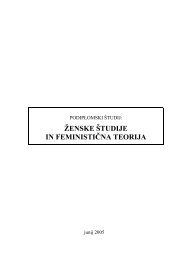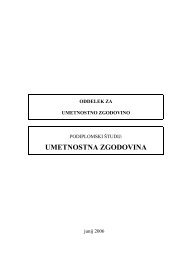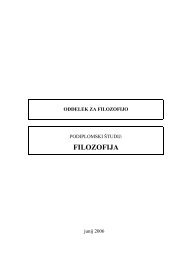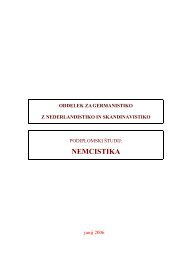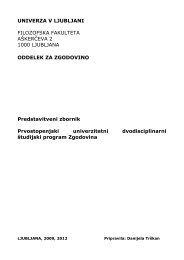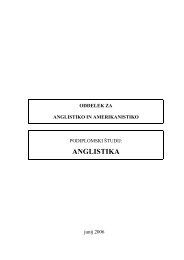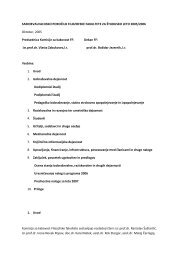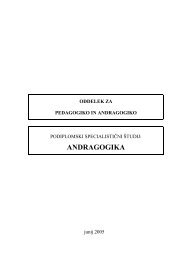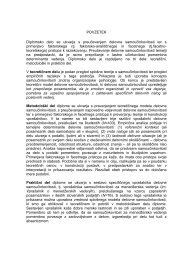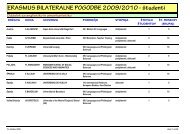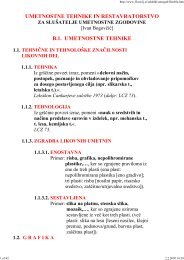- Page 1 and 2:
LINGUISTICA XLIX DEMETRIO SKUBIC OC
- Page 3 and 4:
VSEBINA - SOMMAIRE Nota redazionale
- Page 5:
Liliana Spinozzi Monai IPOTESI DI U
- Page 9 and 10:
Gaetano Berruto UDK 81'27 Universit
- Page 11 and 12:
2. In effetti, la variazione risult
- Page 13 and 14: 3. Si pone ora un’altra domanda:
- Page 15 and 16: entità esistenti in natura si pres
- Page 17 and 18: che la realtà esterna in tutti i s
- Page 19 and 20: zionisti verso l’applicazione di
- Page 21 and 22: sant accennato, la variazione tocch
- Page 23 and 24: hUDSON, Richard (1986) «Sociolingu
- Page 25: Povzetek O MESTU, KI PRIPADA JEZIKO
- Page 28 and 29: Per una prima definizione di «vita
- Page 30 and 31: «potere», assegna a una determina
- Page 32 and 33: sa tabella sopra menzionata), come
- Page 34 and 35: LADINO DOLOMITICO FRANCO-PROVENZALE
- Page 36 and 37: 6. CONCLUSIONI: PROBLEMI APERTI E S
- Page 38 and 39: hAGÈGE, Claude (2000) halte à la
- Page 41 and 42: Paola Desideri UDK 81'276.6''1920/1
- Page 43 and 44: comunicativa l’utilizzo, già dal
- Page 45 and 46: A tali lavori, per completezza d’
- Page 47 and 48: In ogni caso, uno dei primi riferim
- Page 49 and 50: Bretagna dal 1950 al 1980 almeno si
- Page 51 and 52: LASSWELL, harold D. (1939) «The Pr
- Page 53: Povzetek IZVOR IN RAZVOJ ANALIZ IN
- Page 56 and 57: Anstrengung. Vor dem eigentlichen S
- Page 58 and 59: Diese Tatsache ist sehr bedeutend,
- Page 60 and 61: etrachtet wird, ist, dass Sprache i
- Page 62 and 63: es möglich nachzuweisen, welche Ge
- Page 66 and 67: (h) What is more widespread in the
- Page 68 and 69: counterexamples that could not be e
- Page 70 and 71: case. In the antipassive clause the
- Page 72 and 73: I.e., +referential is more natural
- Page 74 and 75: human brain, naturalness scales can
- Page 76 and 77: (5) = h&T (54). Kabardian (NW Cauca
- Page 78 and 79: The absolutive is more natural acco
- Page 80 and 81: agent and the other kind of patient
- Page 82 and 83: 1.2. >nat (unmarked, ergative) / ag
- Page 84 and 85: assume the ergative case and it is
- Page 86 and 87: 1. The assumptions of Natural Synta
- Page 88 and 89: According to the criterion of favou
- Page 90 and 91: (17i) The two variants: ergative an
- Page 92 and 93: hOPPER, Paul J./Sandra A. ThOMPSON
- Page 95 and 96: Michele A. Cortelazzo UDK 811.131.1
- Page 97 and 98: modale quando regge un verbo che ne
- Page 99 and 100: ausiliare potere dovere volere aver
- Page 101 and 102: ausiliare potere dovere volere tota
- Page 103 and 104: del LIP, abbiamo isolato solo 32 co
- Page 105 and 106: Bibliografia BOySEN, Gerhard (1977)
- Page 107 and 108: Gunver Skytte UDK 811.131.1'42:811.
- Page 109 and 110: (4c) Pietro suona, ma maria canta 1
- Page 111 and 112: Per coerenza testuale intendo la st
- Page 113 and 114: (15) der er et flertal for reklame-
- Page 115 and 116:
«ehilà ! ehi, ti sei fatto male ?
- Page 117 and 118:
(34) venuta meno la certezza dell
- Page 119 and 120:
B Fonti secondarie BAZZANELLA, Carl
- Page 121 and 122:
Rosanna Sornicola UDK 811.131.1'367
- Page 123 and 124:
Questi tipi sono stati segnalati da
- Page 125 and 126:
‘a canto, a lato’, peraltro, no
- Page 127 and 128:
nonostante le difficoltà fonetiche
- Page 129 and 130:
fossero invece ancora presenti, sia
- Page 131 and 132:
Sandra Augendre UDK 811.131.1'367:8
- Page 133 and 134:
In modo più preciso, dopo aver pre
- Page 135 and 136:
L’ipotesi secondo la quale il sog
- Page 137 and 138:
nuum tra la classe degli inaccusati
- Page 139 and 140:
Tuttavia, vogliamo precisare che l
- Page 141 and 142:
18% 8% 11% B4: PIERO, ha DORMITO. B
- Page 143 and 144:
VS > SV > S,V > V,S > C’è > Fras
- Page 145 and 146:
I dati così raggruppati ci conduco
- Page 147 and 148:
Invece, due tendenze opposte si oss
- Page 149 and 150:
Come previsto nella descrizione del
- Page 151 and 152:
Nu Num 30 20 20 10 10 0 0 23% 23% B
- Page 153 and 154:
unica struttura risulta totalmente
- Page 155 and 156:
timo governa un’azione verbale di
- Page 157 and 158:
sibilità, la scelta del parlante
- Page 159:
Povzetek OSEBEK IN GLAGOL Z dormire
- Page 162 and 163:
sguardo, 2 messa in rilievo e aspet
- Page 164 and 165:
93). 11 Mentre in italiano la disti
- Page 166 and 167:
nuto richiedono l’impiego della f
- Page 168 and 169:
Calipso, Ogigia, è situata a cinqu
- Page 170 and 171:
soggetti testati riguardo al grado
- Page 172 and 173:
avevano appreso soltanto una parte
- Page 174 and 175:
cominciare a inserire 27 le forme,
- Page 176 and 177:
Con l’uso del PP gli studenti han
- Page 178 and 179:
Mediazione che si rivela più omoge
- Page 180 and 181:
2.8.2 Azioni anteriori nel passato
- Page 182 and 183:
punto di vista degli usi dei paradi
- Page 184 and 185:
porto di contiguità rispetto alle
- Page 186 and 187:
denti è mancata soprattutto la ter
- Page 188 and 189:
(33) Verso la fine del 1510, papa G
- Page 190 and 191:
2.9 Osservazioni generali e confron
- Page 192 and 193:
la deludente. 77 Sembra che, nonost
- Page 194 and 195:
COSERIU, Eugenio (2002 [1978]) «Na
- Page 202 and 203:
Riassunto COMMENTO DELLE SCELTE DEL
- Page 205 and 206:
Fabiana Fusco UDK 811.131.1'374.81:
- Page 207 and 208:
tivi sulla lingua, spesso percepiti
- Page 209 and 210:
più trite dell’amore romantico,
- Page 211 and 212:
minili a quelli maschili o addiritt
- Page 213 and 214:
quindi l’obiettivo di disvelare i
- Page 215 and 216:
dea, stuzzicante per chiudere con v
- Page 217 and 218:
Possiamo pertanto affermare che tal
- Page 219 and 220:
Sostantivi Aggettivi Verbi bellezza
- Page 221 and 222:
Si tratta di voci, le cui citazioni
- Page 223 and 224:
BERRETTA, Monica (1983) «Per una r
- Page 225:
Povzetek STEREOTIP IN SPOL: LEKSIKO
- Page 228 and 229:
nei processi di formazione della pa
- Page 230 and 231:
Come spesso succede (lo hanno fatto
- Page 232 and 233:
tale francese, nonché tribuna per
- Page 234 and 235:
Riassunto TRA SICILIANITà E SICILI
- Page 236 and 237:
destinata a non offrire novità di
- Page 238 and 239:
caviâ [ka’vja:], m.; 1. ‘ciò
- Page 240 and 241:
siömma [si’ma], f.; ‘cantilena
- Page 242 and 243:
tempestare ‘abbattersi furiosamen
- Page 244 and 245:
TOSO, Fiorenzo (1999) «Lì gh’è
- Page 247 and 248:
Alberto Zamboni UDK 811.131.1'282:8
- Page 249 and 250:
Anche le Giudicarie hanno un tipo l
- Page 251 and 252:
inducit»: entrambe le piante sono
- Page 253 and 254:
popolari e arealmente, come ci si p
- Page 255 and 256:
WARTBURG, Walther von (1942) «Rece
- Page 257 and 258:
Roberto Gusmani UDK 811.132.1'373.2
- Page 259 and 260:
Si aggiunga che, nell’ipotesi d
- Page 261 and 262:
Federico Vicario UDK 811.131.1'373.
- Page 263 and 264:
ampiezza, il primo essendo stato pu
- Page 265 and 266:
Madalena Coset Sabida mogler Fidric
- Page 267 and 268:
Margaretta di Mena La mogler Iançi
- Page 269 and 270:
Vignude mogler Zuan Pacet Catarine
- Page 271 and 272:
nella forma tussa, infine, possiamo
- Page 273 and 274:
tà di Pluorn ‘Pioverno di Venzon
- Page 275 and 276:
VICARIO, Federico (2006) «Fonti do
- Page 277 and 278:
Roberto Dapit UDK 811.163.6'282(450
- Page 279 and 280:
del dialetto del Natisone, area in
- Page 281 and 282:
e coincidenza invece si riscontra n
- Page 283 and 284:
discussione: nell’area dialettale
- Page 285 and 286:
Fra i nomi individuati ci sono alcu
- Page 287 and 288:
Avviandoci verso il termine della n
- Page 289 and 290:
primi lineamenti di un vocabolario
- Page 291 and 292:
VIS = ALASIA DA SOMMARIPA, Gregorio
- Page 293:
Povzetek POMENSKA RAZMERJA MED STAN
- Page 296 and 297:
Questi frammenti registrano un gran
- Page 298 and 299:
ḱé jь b di da bi jaz bil (condi
- Page 300 and 301:
denota una sfasatura tra la funzion
- Page 302 and 303:
7002 d i élьj vi imper 2sg «lavo
- Page 304 and 305:
alla semplificazione strutturale de
- Page 306 and 307:
CONCLUSIONE Se i passaggi da noi se
- Page 308:
Povzetek hIPOTEZA O PARADIGMATSKEM



